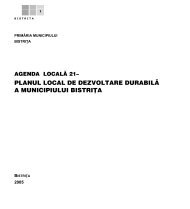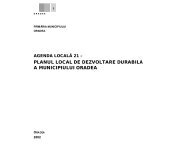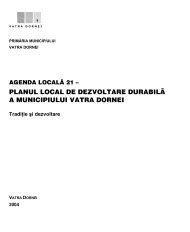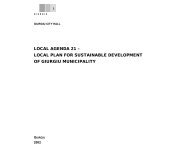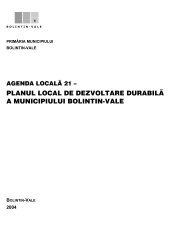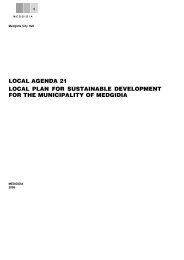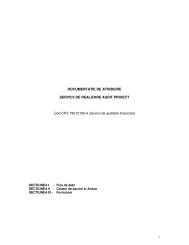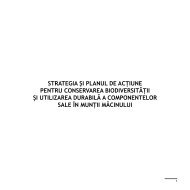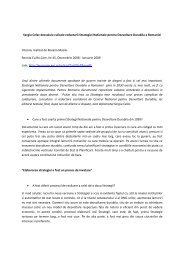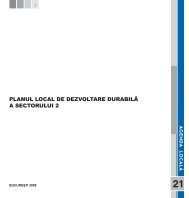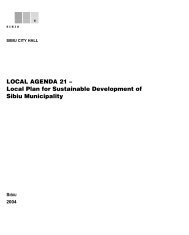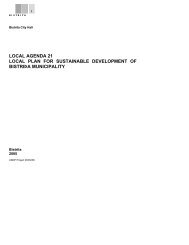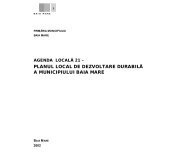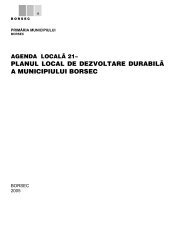English Version - United Nations Development Programme Romania
English Version - United Nations Development Programme Romania
English Version - United Nations Development Programme Romania
Create successful ePaper yourself
Turn your PDF publications into a flip-book with our unique Google optimized e-Paper software.
effects on the environment should be accepted, but under different circumstances an ecosystem or a<br />
certain aspect of the environment must be protected. Thus, a clear notion of the weight given to each of<br />
these factors is required.<br />
Traditionally, the environment has been protected by imposing regulatory measures that control,<br />
for instance, the emission of polluting agents and the exploitation of land. However, rules and regulations<br />
are not always the best way to achieve either environmental or economic objectives. Implementing<br />
regulation might, for instance, involve hidden costs because, it may generate waste that may require<br />
costly treatment processes or storage. Therefore, the simplification of regulations must be compulsory<br />
wherever possible. The use of economic methods is desirable when taking decisions regarding<br />
environmental protection. This could lead to the development of innovative techniques for a better<br />
protection of the environment.<br />
In general, a cost-benefit analysis should be used when deciding which aspect of the environment<br />
must be given priority. Evaluating risks can be useful when decisions and plans are being made in<br />
uncertain conditions. Of course, uncertainties must be identified and must be weighted appropriately<br />
when evaluating risks.<br />
The overall principles of sustainable development have been established, though they will, to a<br />
certain degree, still be the subjects of debates at national and international level. Economic development<br />
is important for any society, but the benefits of economic development must exceed its costs. These costs<br />
also include the price of environmental protection. Currently, attention has to focus on how to apply the<br />
principles of sustainable development to the different areas of economic and social development.<br />
For <strong>Romania</strong>, sustainable development is not a matter of choice, one option among many<br />
others, but it is the only responsible way to plan medium - and long-term development in line with<br />
<strong>Romania</strong>'s national interest and the requirement of international collaboration.<br />
<strong>Romania</strong>'s European and Atlantic integration has been a primary objective which has been<br />
pursued in varying degrees by all governments since 1989, and has always received the support of the<br />
<strong>Romania</strong>n people. This requires <strong>Romania</strong> to adopt a coherent set of values corresponding to those of the<br />
Western civilisation. Correlating the objectives of national development with the experience already<br />
gained by the West regarding the quality of life and the interest in the wellbeing of future generations<br />
is part of this integration process.<br />
Therefore, the first national strategic study for sustainable development does not simply attempt<br />
to follow the most recent trends of the international scientific community. The endeavour to incorporate<br />
the philosophy of sustainable development in any national or local development strategy is essential for<br />
<strong>Romania</strong> to cope with the requirements of, and fit into, the complex world we live in today.<br />
The Objectives of the National Strategy for Sustainable <strong>Development</strong><br />
Sustainable development means progressive improvement and preservation of the population's wellbeing,<br />
paired with rational use of natural resources and conservation of ecosystems.<br />
Fundamental objective:<br />
Increased standard of living and prosperity for individuals and society as a whole at the national level;<br />
economic development within the sustainability limits determined by the natural capital in a way that<br />
should guarantee the quality of life for future generations.<br />
Main objectives:<br />
To guarantee public health. To ensure complementarity and correlation among all economic and social<br />
sectors for the purpose of sustainable human development.<br />
To establish those sectors that could potentially be competitive as priorities for sustainable development in<br />
the context of the overall international trends and in accordance with the international commitments<br />
<strong>Romania</strong> has made.<br />
To adjust the size of social and economic structures, to reshape them and to transform them into a<br />
sustainable system. To ensure the continuous and stable improvement of the standard of living in<br />
accordance with the requirements of E.U. integration.<br />
To stop the deterioration of the country's natural capital and to start rebuilding it.<br />
To develop a coherent legislative and institutional framework, compatible with that of the E.U. countries,<br />
and to consolidate democracy by encouraging civic participation.<br />
To create human resources meeting the international scientific, technological and information standards in<br />
all social and economic sectors.<br />
To ensure continuous monitoring and evaluation of economic, social and ecological performance within a<br />
system of quantitative and qualitative indicators.<br />
10



